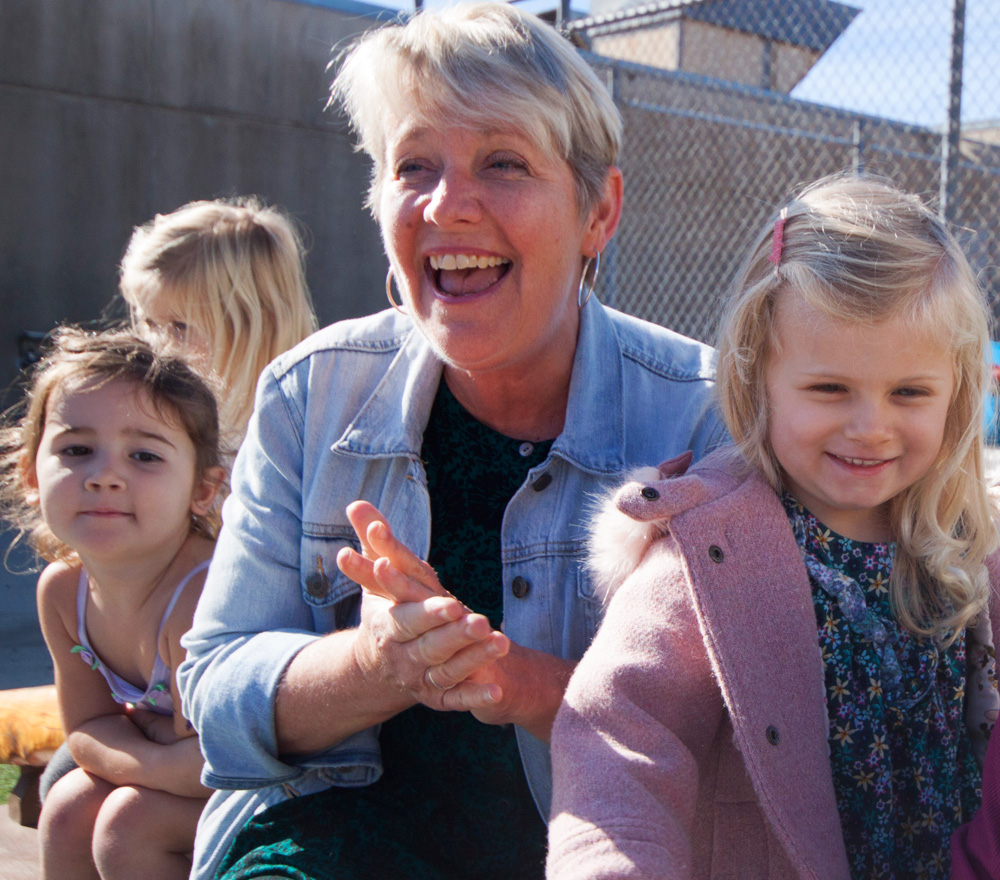By LIV JENKS
On the corner of Fillmore and Jackson stands the imposing edifice that is home to Calvary Presbyterian Church, moved there from the western side of Union Square just in time to open with a community Thanksgiving service in 1902.
Often overlooked is the warm, bright preschool located on the top floor of the adjacent education building, with its rooftop playground, which has been welcoming and shaping 3- and 4-year-olds since 1956.
Deborah Anaya has been director of Calvary Nursery School for 19 years. As she walks through the six mini classrooms that divide the preschool’s open, inviting space, she points with pride to the reading corner, the student artwork that hangs on the walls, the portfolios tracking the progress the children made in learning how to write their names.
With its play-based curriculum, Calvary’s focus is on instilling its young charges with basic human values, such as how to be kind and caring. “It’s not about how the child can fit our program, but how we can fit our program to the child,” says Anaya.
An important aspect of Anaya’s approach as “an active, hands-on director” is mentoring teachers. “I don’t want my teachers to think of me as someone who hangs out in my office and does paperwork,” she says. “I want to model for teachers how to talk to parents in a professional way and how to be present with children — because those relationships build the foundation of our program.”
♦
Anaya, born in Salinas, “the lettuce capital of the world,” grew up in Sunnyvale. She earned her teaching credentials at San Francisco State in elementary education and also in special education and learning disabilities. Early in her career, she taught third grade at the Carden School, worked at the Jewish Community Center’s preschool in San Francisco and in Marin at The Sky’s the Limit, a school for developmentally disabled youth.
Anaya, who describes the Marin school as “heaven on earth,” taught the youngest students with the support of two assistants, in addition to a speech therapist and learning specialists. Then the school moved to San Anselmo, extending Anaya’s commute from her home in the city, just as she and her husband were expecting their first child.
Soon after her daughter was born, Anaya opened Dolores Terrace Preschool on the ground floor of her home. In short order, she went from six to 12 students, remodeling her house along the way to accommodate the growing classes. At Dolores Terrace, Anaya says she aimed to create a nurturing yet structured environment for young learners.
She found that running her own school was both truly wonderful and truly difficult. “I loved that it was my business, so I could call the shots and develop the curriculum in the way that I wanted to,” she says. “The difficult part was that it was all-consuming because it was in our house and it was all up to me. I would spend my weekends cleaning, cooking and making
Play-Doh.”
♦
During her eighth and final year of running Dolores Terrace Preschool, neighborhood resident Carol Edgarian, a parent of one of her “graduating” students, suggested that Anaya apply for the directorship at Calvary.
“My motive was somewhat selfish, ” says Edgarian. “Our daughter loved Deb fiercely and we wanted her to have more time with such an inspired teacher.”
She adds: “Besides, it was time for Deb to spread her wings — and she and Calvary are one dynamic duo.”
Anaya recalls: “It was a challenge at first because I went from my cozy little preschool in the Mission to this big institution in Pacific Heights, a neighborhood that was unfamiliar to me. It took some time getting to know the community and the culture.”
One of the first institutional changes that Anaya made was setting up parent-teacher conferences, instead of issuing progress reports. “The parent-teacher conferences were a dedicated time for teachers and parents to have meaningful, transparent conversations. And it raised the professionalism of the teachers because they were seen as having knowledge about the children,” she says.
♦
After witnessing how the transition to preschool was sometimes difficult for new students, she also created and enforced the rule that parents aren’t allowed to come into the classroom for the first three to five weeks of the year.
“I think parents needed to be given license to leave,” she says, “because no one ever told them it was okay to say goodbye and leave their kids.”
Anaya and her staff have monthly meetings and complete 12 hours of personalized professional development each year, which she believes is critical to keeping teachers engaged.
Two years ago, Anaya completed a master’s degree and wrote her thesis on educating parents about Calvary’s philosophy. “There’s a misunderstanding that play-based education is just play,” she says. “In fact, there are so many layers of skills, and I love talking to parents about those layers.”
She also considers the opportunity to teach parents an added perk of the job.
“The directors and teachers of my kids’ preschools were so formative for me as a parent,” she says. “So it’s really exciting when parents come to me for help, because I want to help them in the same way that many of my kids’ teachers did when I was a new parent.”
She adds: “I want to grow up to be like those teachers.”
Filed under: Body & Soul, Locals





